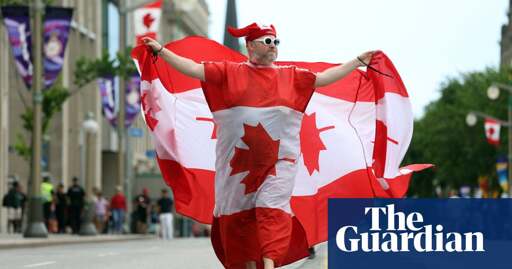A lone figure takes to the stage, a giant maple leaf flag rippling on a screen behind him as he gingerly approaches the microphone.
“I’m not a lumberjack, or a fur trader,” he tells the crowd. “I have a prime minister, not a president. I speak English and French, not American. And I pronounce it ‘about’ – not ‘a boot’.”
The crowd, indifferent at first, grows increasingly enthusiastic as the man works his way through a catalogue of Canadian stereotypes, passing from diffidence to defiance before the climactic cry: “Canada is the second largest landmass! The first nation of hockey! And the best part of North America! My name is Joe! And I am Canadian!”
In response, Canadians have taken to acts of patriotism, small and large: one pilot flew his small plane in the shape of a maple leaf; sports fans have booed US teams; hats insisting “Canada is not for sale” have gone viral; consumers have pledged to buy only Canadian-made products – a pledge skewered in a viral sketch in which one shopper berates another for buying American ketchup.



Only a fool doesn’t believe when some tells them their intentions and is surprised when it happens.
If I am wrong, I will be happy that I was prepared for the worst.
If you are wrong, your world will be crumbling because you don’t want to imagine that you are wrong.
I hope you are right. At least I will be ready if you are wrong.
You’re right that being prepared is better than being blindsided, but preparation without discernment is just paranoia in disguise. Not every statement or intention is a prophecy; sometimes it’s just noise meant to provoke.
If your readiness gives you peace of mind, that’s fine. But don’t confuse it with a guarantee that the worst will happen. Living in constant anticipation of collapse isn’t strength—it’s surrendering to fear.
Instead of bracing for an apocalypse that may never come, maybe focus on building something worth preserving. Fear doesn’t make you prepared—it just keeps you stuck.